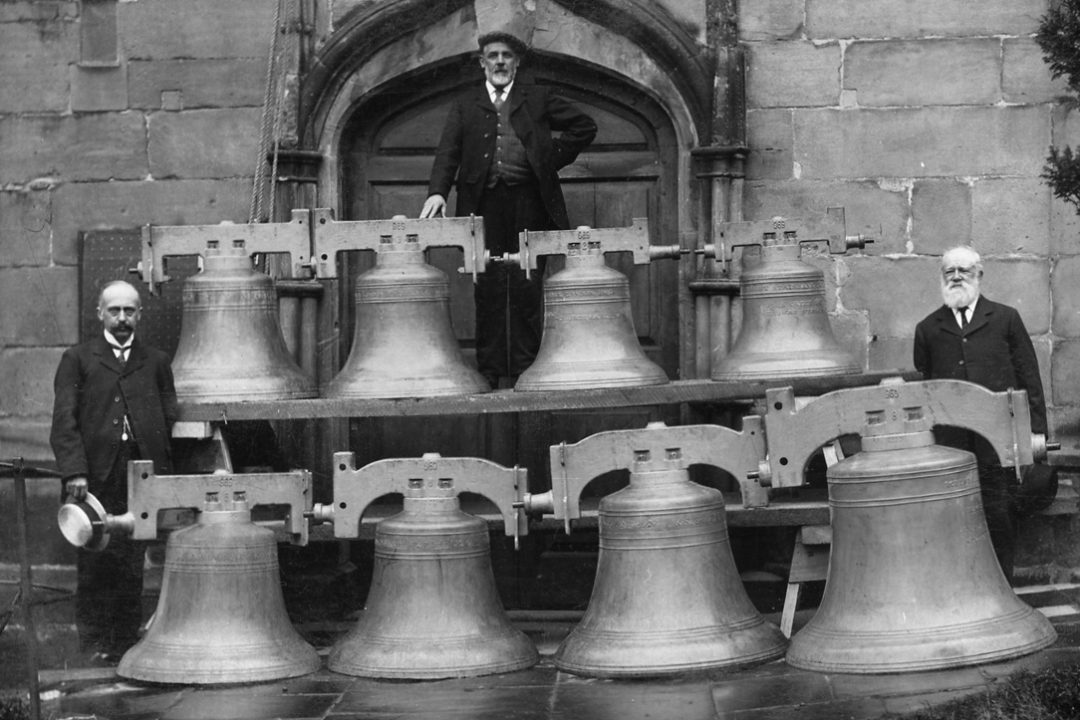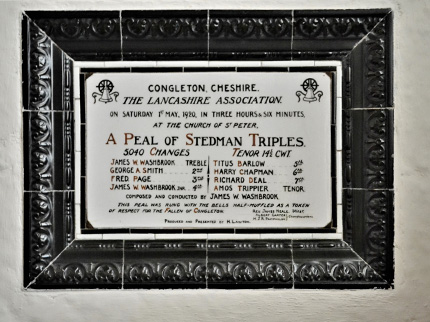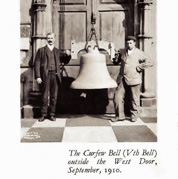St Peter’s Church Bells
St Peter’s has a peal of eight bells which are rung regularly. The earliest records from the reign of Elizabeth I show that bells in the old chapel had been cast by Henry Oldfield of Nottingham.

St Peter’s has a peal of eight bells which are rung regularly. The earliest records from the reign of Elizabeth I show that bells in the old chapel had been cast by Henry Oldfield of Nottingham.

Paul Hutton of the Congleton foundry recast three of the bells and added a treble circa 1635.
In 1720 the five bells were recast into six by Rudhalls of Gloucester. The Articles of Agreement still exist in the town archives. Rudhalls had to carry five bells to Gloucester, and deliver six new bells back having checked that they were good, new tuneable ones. The cost of the bells and the clappers would be £40. Ever mindful of the weight of the bells, the agreement specified that the ‘six new bells shall containe in weight as near as may be to the five old ones.’ If needs be the Mayor and Corporation would pay Abraham Rudhall for additional metal. If any of the bells ‘should brake or are not tuneable within a year after they were rehung’, then Abraham Rudhall was ‘to exchange the same at his own costs and cause the same to be hung up as may be.’
According to Raymond Richards the 1720 bells are inscribed ‘God direct the consultation of the Corporation 1720’, ‘Peter Lingard, Jno Shaw, Jno Varden, Aldermen, A.R. 1720’; and ‘Thomas Shaw, Jno Jackson, Jno. Wood, Alderman, A. R. 1720. These inscriptions are an emphatic reminder that the church was under the control of the Corporation.
With the rebuilding of the church in 1740-1742 the tower of the old chapel was kept. This is indicated by two sketches which were made of it and which were in a book, now disappeared, in the possession of the Town Clerk. The bells seem to have been hung in the old tower attached to the newly rebuilt church. Rudhall cast a seventh bell in 1757. This bell has the inscription, ‘Prosperity to this parish. A.R.1757’.
Two further storeys were added to the tower in 1786. Another bell was commissioned from Thomas Mears and Sons of London in 1806. All eight bells were rehung by John Taylor of Loughborough in 1911 and the same firm overhauled them in 1933.

In addition to the usual times of bell ringing, they were rung on several other occasions. One was the Pancake Bell that was rung at 11 am on Shrove Tuesday to release the boys from the nearby Grammar School for the day. Until 1839 the tenor bell rang each weekday night at 10 pm and on Sunday at 9 pm to warn innkeepers to eject drinkers and shut down their inns. In addition, Robert Head in his book about Congleton, mentions the Noon or one o’clock bell and the Curfew Bell. The Pancake Bell and the Noon Bell have been discontinued. The Curfew was rung on the fifth bell each night at 8 pm, except for Saturdays and Sundays. Its ringing dated from 1068, when it was ordered that a bell should be rung to warn householders to cover or extinguish their fires using a cover (French: couvre-feu). This continued into the twentieth century.